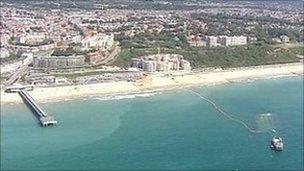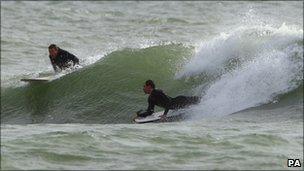Boscombe surf reef 'damaged by boat propeller'
- Published

The £3.2m underwater reef will remain closed until the damage has been repaired
The artificial surf reef off the Dorset coast at Boscombe, which has been shut due to safety concerns, is thought to have been damaged by a boat propeller.
The £3.2m underwater reef was closed in March after an inspection found "substantial changes" to its shape.
ASR Ltd, the firm commissioned to build the reef, and Bournemouth Borough Council believe a sand bag had been torn by a boat propeller.
Work must be carried out on the reef before it can reopen.
It was created to enhance waves using 55 giant sand-filled bags, which are 740ft (225m) out at sea.
Inspections of the reef have been carried out and the council has spoken to its insurers as it believes the damage to be accidental.
Bag completely empty
A council spokeswoman said: "When there's a hole in the bag the sand quickly empties with the ebb and flow of the tide.
"The loose fabric then gets tugged by the tide and stresses the seam.
"One bag is completely empty and looks like it's disappeared - the damage appears to be on the neighbouring bag. This needs to be repaired asap."
Bournemouth Borough Council has advised people not to use the reef while it undergoes the maintenance.
It said it was "erring on the side of caution".

The reef opened in November 2009 as part of the regeneration of Boscombe seafront
The reef opened in November 2009 after lengthy delays and running over budget, as part of the regeneration of Boscombe seafront.
It has been criticised for not working properly but many traders have argued it has added to the regeneration of the once-rundown area.
The council has withheld £150,000 from New Zealand-based ASR Ltd after a specialist report found the reef had not achieved all of its objectives.
It will pay £55,000 when refinement work is finished and a further £95,000 if the improvements are successful.
ASR Ltd has denied the reef failed and said it was only one of the criteria, the wave lengths, where it had not met the requirements.
The impact of the surf reef on the local economy is being assessed by Bournemouth University as part of a three-year study, as requested by the Crown Estate which owns the UK seabed.
- Published2 April 2011
- Published31 March 2011
- Published15 December 2010
- Published3 November 2010
- Published28 October 2010
- Published10 August 2010